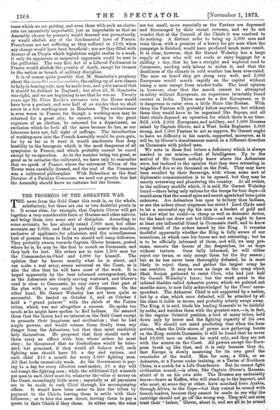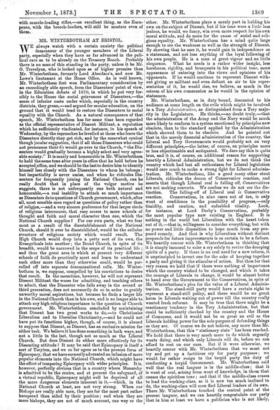THE PROGRESS OF THE ASHANTEE WAR.
THE news from the Gold Coast this week is, on the whole, satisfactory, but there are one or two doubtful points in it. It seems clear, for example, that Captain Glover will get together a very considerable force of Houssas and other natives, and bring them into some sort of discipline. According to some accounts, he has already raised 7,000 men, but other accounts say 2,000, and that is probably nearer the number, exclusive of applicants for admission, and the miscellaneous host of persons whom in India we should call camp followers. They probably swarm towards Captain Glover because, posted where he is, he may be the first to march on Coomassie, and they look for loot. His orders are to raise 1,200 men for the Commander-in-Chief and 4,000 for himself. The opinion that he knows exactly what he is about, and can make a real army, seems universal on the Coast, as is also the idea that he will have most of the work. It is hoped apparently by the best informed correspondent, that as the Ashantees are clearly moving westward, and Glover's road is clear to Coomassie, he may carry out that part of the plan with a very small body of Europeans. On the other hand, Sir Garnet Wolseley has not been quite so successful. He landed on October 3, and on October 4 held a "grand palaver" with the chiefs of the Fantee tribes, which was not altogether a success. He spoke too much as he might have spoken to Red Indians. He assured them that the Queen had no interest on the Gold Coast except to promote their happiness and civilisation ; that he had ample powers, and would release them finally from any danger from the Ashan tees, but that they must resolutely help themselves. He proposed that they should each of them carry an officer with him whose orders he must obey ; he threatened that no disobedience would be toler- ated, but promised, if they would all behave well, each fighting man should have 3d. a day and rations, and each chief i10 a month for every 1,000 fighting men. All that looks excessively weak. As the Government is pay- ing is. a day for every effective road-maker, 3d. a day will not tempt the fighting men ; while the additional 2,1-d. a month per man to each chief must be, whatever the value of money on the Coast, exceedingly little more ; especially as all payments are to be made to each Chief through his accompanying officer. It would have been easier to hire the tribes by payment to the Chiefs, leaving them to settle with their followers ; or to hire the men direct, leaving them to pay a quota to their Chiefs if they chose. In either case, the sums are too small, more especially as the Fantees are depressed and discouraged by their recent reverses, and we do not wonder that at the Council of the Chiefs it was resolved to do nothing. A distinct order to bring up 5,000 men and train them, with a promise of a heavy fee per man when the campaign is finished, would have produced mueh more result. It is clear, however, that Sir Garnet Wolseley has a large supply of men who will cut roads or carry baggage for a shilling a day, that he has a straight and explored road to Coomassie, needing only labour to widen it, and that the deadliness of the climate in cold weather has been over-rated. The men on board ship get along very well, and 2,000 Europeans would march rapidly on the capital without losing a man except from musket-balls. The local opinion is, however, clear that the march cannot be attempted in safety without Europeans, an experience invariably found correct in India. There must be a few Europeans, or it is dangerous to enter even a little State like Bootan. With them the Fantees will probably follow anywhere, but without them they would have to be organised like Sepoys, and all their chiefs deposed, an operation for which there is no time. Still, with 2,000 Europeans, and artillery, and 1,000 Houssas raised by Captain Glover, and a West India Regiment 1,000 strong, and 7,000 Fantees to act as sappers, Sir Garnet ought to have no difficulty in his march, supported, moreover, as it will be, by Glover's simultaneous march in a different direction on Coomassie with picked men.
We note in these first letters a deficiency which is always marked in our armies,—that of Intelligence. Up to the arrival of Sir Garnet nobody knew where the Ashantees were, but inclined to the opinion that they were retreating in brigades of five or six thousand on the Prah. They may have been recalled by their Sovereign, with whom some sort of diplomatic communication is to be opened, but they may be merely overawing and plundering the country. At all events, in the military muddle which, it is said, Sir Garnet Wolseley found—there being only rations for the troops for four days—it would seem that the rises of spies and secret agents had been quite unknown. Are Ashantees less open to bribery than Indians, or are the orders about sixpences too strict ? Lord Clyde used to let a successful spy dip his arm in a bucket of gold and take out what he could—a cheap as well as dramatic device, for the hand can draw out but little—and we ought to have at least one influential friend in Coomassie itself, and to know every detail of the orders issued by the King. It remains doubtful apparently whether the King is fully aware of our intentions, in which case his forces are not retreating ; but he is to be officially informed of them, and will, we may pre- sume, execute the bearer of the despatches, let us hope
without torture. Once fully informed, he will either reject our terms, or only accept them for the dry season ; but as he has never been thoroughly defeated, he is most likely to reject them, and gather the largest army he can contrive. It may be even as large as the army which Shah Soojah gathered to resist Clive, who had just half
Sir Garnet Wolseley's force ; but the weak point in the inflated bladder called Ashantee power, which we pointed out months since, is now fully acknowledged by the Times' corre-
spondent. The Ashantee Chief is not supported by a nation, but by a clan, which once defeated, will be attacked by all
the clans it holds in terror, and probably utterly swept away.
The King, it is said, binds his leading Generals to be faithful by oaths, and watches them with the greatest care,—is, in fact, in the regular Oriental position, a lord of many tribes, held down only by terror and the fighting capacity of hie own clan. We should not mind predicting that when the hour arrives, when the little storm of power now gathering bursts on the King outside Coomassie, it will be found that he never had 10,000 men on whom he could rely, and they are not with the armies on the Coast. All powers except the Euro- pean break up like that, and it is only because they do, that Europe is slowly mastering for its own good the
remainder of the world. Man for man, a Sikh, or an
Ashantee, or a Parsee under training, or a Tartar of Northern China, is a match for a Life Guardsman. But he cannot fight civilisation armed,—is often, like Captain Glover's Houssas, afraid of it on his own side. The Houssas are undeniably brave—brave as Kaffirs, who will stand up to the bayonet, and who must, at some day or other, have marched from Arabia,
through Africa, to the Cape—but they cannot be armed with breech-loaders, because they cannot be made to see why the cartridge should not go off the wrong way. They will not even trust their "father," Glover, about it, and are all to be armed wit)? muzzle-loading rifles,—an excellent thing, as the Euro- peans, with the breech-loaders, will still be masters even of them.



































 Previous page
Previous page